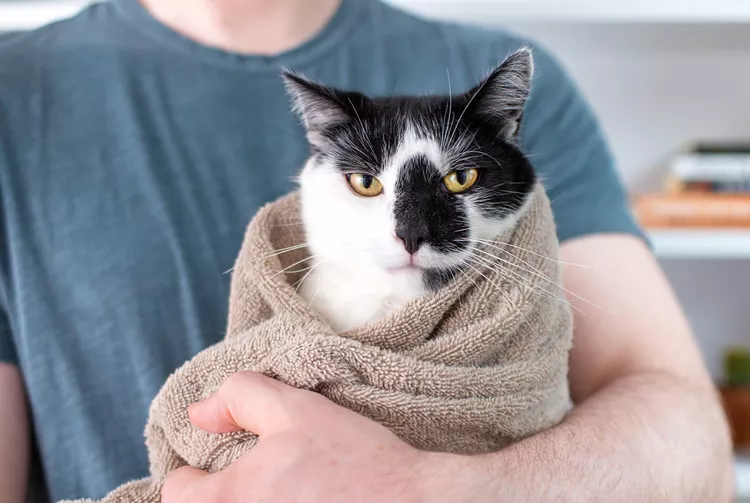How to Burrito a Cat and Avoid Feline Fussiness

Have you ever tried to handle your cat only to have it turn into a wiggly ball of claws and teeth? That's when knowing how to burrito a cat can come in handy.
As a cat owner, you'll need to occasionally handle your pet so you can give it medications, groom it, or check it over. Not all cats can tolerate handling. In fact, many cats get extremely stressed out if you try to handle them in any way. Fortunately, there is a technique you can use with a towel to swaddle your cat into a kind of cat "burrito" or, "purrito,"making the process much easier and safer for both you and your feline friend.
What Is a Cat Burrito?
The terms cat burrito and purrito refer to a towel-wrapping technique used to swaddle a cat for safe handling. It's a fairly easy way to restrain a cat while easing the stress and allows you to handle the cat without getting hurt.
Reasons to Burrito a Cat
Cat burritos are very effective for accomplishing several tasks, such as:
- Giving medications by mouth or in the eyes, ears, or nose
- Cleaning their ears
- Checking an area on the cat's head, face, or the mouth
- Brushing their teeth
- Nail trims
- Checking their paws
- Cleaning or trimming the fur around the tail and rear area
If you have trouble getting your cat wrapped, ask someone at your vet's office to show you how.
Why Cat Burritos Help Some Cats
Many cats become stressed and fearful when being handled and will exhibit an aggressive fight-or-flight response. This is especially common at the veterinarian's office, where cats may feel cornered and vulnerable. Most cats will try to run away and hide, fighting off whatever gets in their way. This can lead to injuries in both cats and humans.
Veterinarians and staff have tools and tricks that allow them to safely and humanely handle stressed cats. One of the simplest of these tools is a basic towel. A towel will not completely protect a person from bites and scratches, but it can minimize the damage a cat can do. A towel will be able to do the following:
- Create a barrier between you and your cat to help protect you from claws and teeth
- Restrain a cat for handling while creating as little stress as possible
- Add gentle pressure to provide a sense of comfort for the cat
- Limit the movements of a cat to keep you as safe as possible
Warning
Do not attempt to handle a cat that is extremely stressed or angry because you and the cat may both be injured. Do not attempt to handle the cat if it is doing the following:
- Vocalizing
- Biting
- Scratching aggressively
- Panting (stop and observe the cat from a distance)
Give the cat a chance to calm down and try the handling another day or let the vet's office handle the restraint. Some cats will need to be sedated (put in a sleep-like state which differs from anesthesia) for safety reasons.
How to Make a Cat Burrito
All you need to burrito your cat is a towel. Choose a bath or beach towel that is not too thick or plush (thinner towels are easier to manipulate into a burrito). A larger beach towel is ideal, especially for large cats. Also, gather any tools you may need, such as medications and nail trimmers. The last thing you want is to carry around a cat in a burrito while looking for the supplies you need.
Lay the Towel Flat
Lay the towel flat on a solid surface like a floor, counter, or table. Make sure the towel is positioned horizontally to you.
Pick Up the Cat
Gently pick up your cat while speaking to it in a calm, soothing tone. Offer valuable treats if your cat is food-motivated.
Place Cat in the Middle of the Towel
Place the cat in the middle of the horizontal towel. It doesn't have to be perfect, even if you have your cat closer to one side, that's fine.
Try to Get the Cat to Lie Down
Gently place a hand on the back of its neck, then lay your forearm over its body (spine) and apply a gentle downward pressure to keep your pet still. If the cat will not lie down, don't force the issue. The cat may modify its position as you proceed to wrap it.
Wrap One End Over Cat's Back
Take a top corner of the towel near the cat's head and bring it over so it wraps around its back, leaving only the head exposed. Tuck the cat's tail to the side of its body so it stays inside the towel. Wrap the top corner of this side around the neck gently, making sure the paws are inside the towel.
Switch Hands
Switch hands and maintain gentle pressure on the cat's back.
Wrap Other End of Towel
Take the other top corner of the towel and wrap that end firmly over the cat's back.
Lift the Cat and Wrap the Remaining Towel
Gently lift the cat and wrap any remaining towel under the cat's body. Offer your cat a treat at this point so it can associate towels with pleasurable treats.
Brace the Wrapped Cat Against Your Body
Use one arm to brace the wrapped cat against your body while you give medications, clean ears, or do anything else needed to your cat's head. Do not let go or the cat will escape the towel wrap.
Repeat the Wrapping Process for Nail Trims and Paw Handling
For nail trims or paw handling, repeat the wrapping process but leave one or both paws out of the towel. If you need to access the tail or rear end, leave this part exposed.